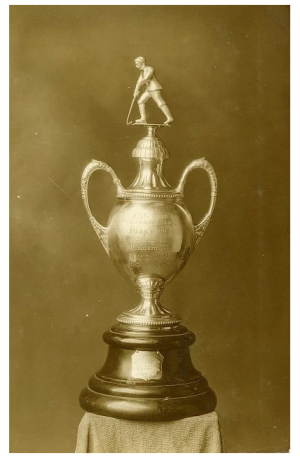Sumner Cup
The Sumner Cup was created for the winner of a new Intercollegiate Hockey League, established in Atlantic Canada in the 1908-09 season, the Maritime Inter-provincial Intercollegiate Hockey League (MIIHL). The original league, Maritime Intercollegiate Hockey League - MIHL, had played for the Hewson Cup. The first team to win the Sumner Trophy 5 times would retain the trophy.
The new league comprised of the 'football' teams of UNB, Mt. A. and Acadia, leaving St. Francis Xavier out. This occurred minutes before the 1908-09 MIHL league meeting, in late December, and was driven by a belief of the three teams that St. FX had been knowingly using ineligible players. In 1911 Kings's College (Halifax) join the MIIHL to make it a four team league. For the first few years (when it was 3 teams), the teams would play home-and-home series for the title followed later by a East vs West approach where the winner of the West (UNB, Mt. A. or Acadia) would play King's in a single game championship.
The MIHL was active during this period with Dalhousie, N.S. Tech and St. FX and Mt. A who playing in both leagues. Instead of the Hewson Trophy, they were now playing for the Brown Trophy.
Neither league played during WWI.
In 1919-20 both leagues started again but there was less division in the league as everyone but King's joined the MIHL (now playing for the Halifax Herald Shield) leaving the MIIHL as a parallel league of four teams where the West teams would play against each other for the right to play King's in the final. The MIIHL came to an end in 1927-28 when UNB won the Sumner Trophy for the 6th time (there 1911 title was disputed. UNB is engraved on the trophy but it did not count towards their total championships and retention of the trophy).
1911 Dispute
UNB felt that their sound defeat Mt. A in their last game of the season would give them the title, but Acadia disputed this assertion based on a tie game that had happened a few weeks earlier in Wolfville. UNB had appealed the tie on the grounds that the tying goal hadn't gone in, but in fact had rested on-top of the net and the goal judge's arm movements were of excitement, not the true indication of a goal. The game ended tied and remained tied after 2hr and 5min of overtime (reported at the time as the longest game every played) with no winner declared. Acadia's view was the game was a draw and wanted a rematch for the league title. UNB's appeal was never heard due to no real governing body being available to rule and Mt. A's Athletic Department representative showing no interested in attending a meeting. UNB appealed to the trophy's trustee and in the end was awarded the title, but it would not count towards their total championships.
Trophy Whereabouts
The trophy remains in UNB's possession and is on display in the trophy case in the Ashley A. Colter Reception Room above the box office of the Aitken University Centre on the Fredericton campus of the University of New Brunswick.
External link:
Winners of Intercollegiate Hockey League
- 1909 University of New Brunswick (9-4 over Acadia)
- 1910 Acadia University (9-2 over Mt. A)
- 1911 University of New Brunswick (6-4 over Mt. A) *disputed
- 1912 season suspended
- 1913 King's College (forfeit - no opponent)
- 1914 Mount Allison University (4-2 over UNB)
- 1915 Mount Allison University (4-3 over Acadia)
- play did not resume until after World War I in the 1919-20 season
- 1920 Acadia University (as winner of Maritime Intercollegiate League Western Section)
- 1921 University of New Brunswick (6-5 OT over King's)
- 1922 Mount Allison University (6-3 over King's)
- 1923 University of New Brunswick (7-5 over King's)
- 1924 Acadia University (5-0 over King's)
- 1925 University of New Brunswick (2-0 over King's)
- 1926 University of New Brunswick (6-0 over King's)
- 1927 Mount Allison University (3-1 over King's)
- 1928 University of New Brunswick (King's forfeit)
In 1927-28, King's College forfeit the final just prior to UNB boarding a train for Halifax. Someone had broken into their arena the previous night and had stolen their skates and equipment.
| This page uses Creative Commons Licensed content (view authors). |
